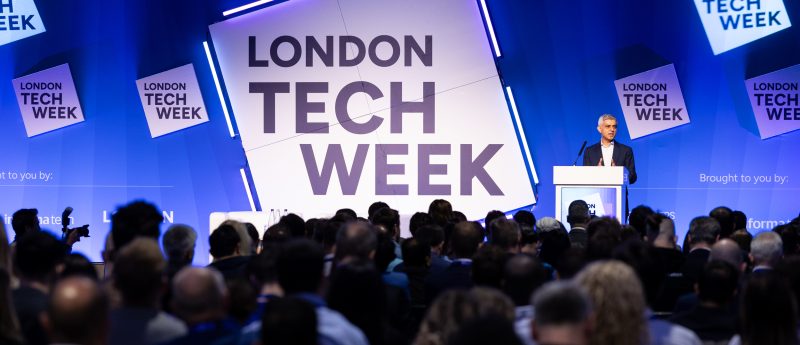London Tech Week 2024 | Life Sciences Roundup

Image credit: SEB HIGGINS PHOTOGRAPHY
Over the three days of London Tech Week 2024 there was plenty of life science activity to digest. Regardless of whether you attended or not, this article provides some curated highlights of the most exciting talks, pitches, and products across the event. It’ll cover topics spanning medicine and healthcare research, through to sports, drones and more. Website and profile links are included for your convenience.
Our Top Pick
Charco Neurotech presented a life-changing non-invasive medical device to alleviate movement symptoms in Parkinson’s suffers. Scroll down to the ‘Health Tech Showcases’ section to learn more.
Key Trends
In Medicine- Clear pivot towards AI for drug discovery and precision medicine
In Healthcare- Significantly less hype around ‘black box’ AI for diagnostics and a shift towards improving workflow efficiency for staff. Suggested as more pragmatic approach to improving healthcare at a greater scale.
Women’s Health- There was a lot of discussion around women’s health and how AI can be used to improve it. Numerous companies focusing on this area and many with AI products.
GSK | Doubling Down on Personalised Medicine and AI
As the only pharmaceutical company attending the event, GSK was present in abundance with a number of senior staff hosting talks.
Shobie Ramakrishnan, Chief Digital and Technology Officer at GSK, spoke confidently about the importance of AI in GSKs work and the field of biology as a whole:
“I’m very, very optimistic that the next decade of innovation is going to be shaped by how data and AI is going to help us understand and engineer biology and therefore change the course of disease entirely”

Shobie also spoke about a fundamental skills transformation in the company’s workforce as AI is used to accelerate workflows. She gave some insights into how it is being used to do this, suggesting it will serve an ambient role for staff:
“We’ve deployed [AI] to help people read and be confident, summarize and synthesize scientific documents, to understand policies in the company, to offer documents much faster, write marketing plans, et cetera.”
The new SVP of Research Technologies Christopher Austin described his intriguing move from the start-up space to big pharma and explained how the “ball is in our court at GSK for delivering for patients in a ways that have never been possible before”. In this he was referring to the use of AI to supercharge personalised medicine from genetic data, allowing identification of precise molecular targets in patients.
“in the same way as you can use your Google map to get from point A to point B because you have a map of the whole system, that’s what we’re starting to be able to do in drug development, and that promises with the advent and the proper use and the proper acquisition of data, it allows us to envision a world, a future that is 10 to 100 times as predictive and therefore successful in making treatments that affect human health.”
The Power of AI to Transform Healthcare
A diverse panel of leaders from across the healthcare and biotech spaces took to the stage to discuss the impact of AI on their work and its unparalleled potential to improve healthcare.
Overview
- A strong consensus towards broad and highly scalable AI solutions in the near future. For example those which augment administrative tasks.
- By increasing the efficiency of healthcare staff and their ability to make more informed decisions, these solutions will maximise benefits to the wider patient population.
- This is not to discount the importance of narrower AI tools, such as for medical imaging analysis. Rather it suggests the most directly impactful implementation of AI in the immediate future.
Companies, leaders and highlight conversations from the discussion:
Cera Care | AI to Transform Elderly Care
Cera is using AI to predict health issues in elderly paitents, helping to prevent hospitalisations. By analyzing data from home visits, AI can forecast potential problems a week in advance with about 80% accuracy, allowing preemptive interventions. By doing so they have been able to cut hospitalizaiton rates by over half.
Ben Maruthappu, the CEO and co-founder, explained that his company has achieved remarkable growth to deliver over 60,000 appointments a day, significantly reducing pressure on the NHS.
“We look after 2 million patients visits a month, which is equivalent in scale to all NHS A&Es in the country. And our continuous ambition is to support people in the aging world in their own homes.”
Ben emphasised the need for user-friendly tools for healthcare professionals to ensure adoption. He also described the importance of demonstrating clear improvements in patient outcomes and efficiency to drive this adoption further.
Mammoth Biosciences | CRISPR and AI
Trevor Martin, founder and CEO of Mammoth Biosciences, spoke about using AI to enhance CRISPR technology for treating genetic diseases. He detailed how AI aids in statistical modeling and drug discovery, improving the precision and efficiency of CRISPR applications.
Trevor highlighted the practical applications and potential of CRISPR, underscoring its transformative capability to cure diseases previously thought untreatable.
He also discussed the need for AI to transition from hype to real-world impact, emphasizing the importance of delivering tangible patient benefits. His ambition is to eventually do all drug design in-silica. He also touched on the power of tools like Alpha Fold 3.
“what I’ve seen is that we can get 20%, 30% better and put these kind of technologies like AlphaFold and things like that in the hands of scientists. And that’s transformative. If we can have 10% more drugs every year, I think people underestimate how valuable– how many millions of lives will be saved.”
Conceivable Life Sciences | AI in Global Health and IVF Automation
Stephanie Kuku, a gynecological oncologist and advisor for the World Health Organisation and University College London, is the chief knowledge officer at Conceivable Life Sciences– a start-up using robotics, machine vision and AI to automate the IVF laboratory.
Stephanie emphasized the need for AI to improve access, reduce costs, and optimize workflows in health care. She called for investments that prioritize ethical impacts and long-term benefits, stressing the importance of proving AI’s value in practical, patient-centered applications.
Monika Gullerova | RNA Therapeutics and AI
Monika Gullerova, a professor of molecular genetics at the University of Oxford, emphasized the importance of recent developments such as Alpha Fold 3, which have revolutionized the ability to predict RNA structures.
She highlighted the emerging field of RNA therapeutics, where AI is instrumental in developing novel drugs by providing insights into RNA structures and interactions.
Health Tech Showcases
Charco Neurotech | Treating Parkinson’s Symptoms with Non-invasive Wearable Technology and AI
Lucy Jung, the founder and CEO of Charco Neurotech, shared insights into her company’s work in developing life-changing medical devices for Parkinson’s patients.
Charco Neurotech’s flagship product, the CUE1, is a non-invasive wearable device designed to alleviate movement symptoms in Parkinson’s patients through high-frequencyvibrotactile stimulation combined with rhythmic queuing.
Collaboratively developed with patients and clinicians, the CUE1 has shown significant improvements in movement, such as reducing stiffness and rigidity.
At the event Lucy even showed a painting a patient had done after using CUE1. Beforehand the patient simply could not have done so.
The device is already being used by over 3,000 individuals, with ongoing studies to explore its long-term benefits and potential applications for other movement disorders.
Precision Sports Technology | Real Time Exercise Analysis and Feedback using AI
Precision Sports Technology, under Emma Meehan’s leadership, is dedicated to enhancing movement quality and competency in exercise.
The company has developed an innovative software platform that provides real-time feedback on exercise form, helping to prevent injuries and improve training outcomes.
Their latest product, KineticIQ, leverages LiDAR and AI technology to offer detailed movement metrics without the need for wearables, making it a valuable tool for physiotherapists, sports scientists, and strength and conditioning coaches.
Emma’s vision is to expand the application of their technology beyond sports to areas like workplace safety and digital health, ultimately making movement health more accessible and effective for everyone.
Apian | NHS Drone Delivery Network
Hammad Jeilani, co-founder and CEO of Apian, presented his innovative healthcare logistics startup that uses autonomous drone solutions to improve the delivery of medical supplies.
His company aims to improve the delivery of medical supplies, such as blood samples and medicines, by leveraging drones to ensure timely and efficient transport.
Apian’s platform connects healthcare facilities with drone operators, enabling seamless ordering, tracking, and delivery of medical supplies.
By establishing a London NHS drone delivery network, Apian seeks to overcome current logistical challenges, reduce pollution, and enhance patient care.
Hammad’s vision is to make healthcare logistics as fast and reliable as consumer delivery services, partnering with top drone manufacturers to achieve this goal.
Hertility | Revolutionizing Women’s Health with Data-Driven Solutions
Building the largest dataset of gynaecological pathologies from more than half-a-million women, Hertility’s mission is to empower women to better manage their health through various reproductive life stages.
Helen O’Neil, the co-founder of Hertility (who is also a Lecturer in Reproductive and Molecular Genetics at University College London), spoke passionately about how prevalent, pervasive, and underserved women’s health conditions are.

We know 100% of women will experience hormone-related changes in their lives. We expect these things to be. These are punctuated reproductive events, whether it’s puberty, whether it’s pregnancy, whether it’s menopause or perimenopause, we know these life-stage events are going to happen. And what do we do to prepare? Absolutely nothing. And they have huge biological consequences for our health and our longevity as well. So, what we want to do is prepare all women for these life stages by giving them better information about the hormones that dictate each of the events that are going to happen.
Using their dataset, Helen and her team have built an algorithm capable of screening 21 different conditions between 98 and 99% confidence with both precision and recall.
Hertility currently provides health assessments, at-home tests, personalized results, telemedicine, and ongoing support. They are also developing an app to provide real-time information and support for women’s health issues.

